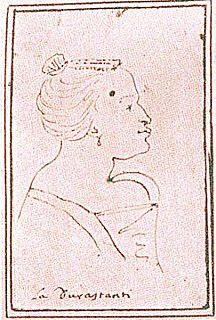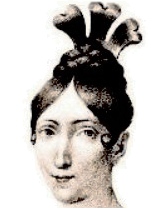 W
WArmanda Degli Abbati, also known as Armanda Degli Abbati Campodonico, was an Italian opera singer who sang leading mezzo-soprano roles in the opera houses of Italy, South America, and Russia. In 1926 she settled in Estonia where she became a noted vocal pedagogue and trained a generation of Estonian opera singers. She was deported from Estonia during the Soviet occupation in World War II and is presumed to have died in a prison camp in Karaganda.
 W
WCecilia Bartoli, Cavaliere OMRI is an Italian coloratura mezzo-soprano opera singer and recitalist. She is best known for her interpretations of the music of Bellini, Handel, Mozart, Rossini and Vivaldi, as well as for her performances of lesser-known music from the Baroque and Classical period. She is known for having the versatility to sing both soprano and mezzo roles.
 W
WAdelaide Borghi-Mamo was an Italian operatic mezzo-soprano who had an active international career from the 1840s through the 1880s. She was married to tenor Michele Mamo and their daughter, soprano Erminia Borghi-Mamo, also had a successful singing career.
 W
WElvira Casazza was an Italian mezzo-soprano opera singer. One of Toscanini's favourite singers, she was considered an outstanding interpreter of Mistress Quickly in Verdi's Falstaff during the 1920s and created several roles in Italian operas of the early 20th century.
 W
WMargherita Durastanti was an Italian singer of the 18th century. Vocally, she is best described as a soprano, though later in her career her tessitura descended to that of a mezzo-soprano. First heard of professionally in Mantua in 1700–01, she later appeared in Bologna and Reggio Emilia (1710), Milan and Reggio (1713) and Florence (1715). Today she is particularly remembered for her association with the composer George Frideric Handel: indeed she enjoyed a longer personal association with the composer than any other musician.
 W
WFanny Eckerlin (1802–1842) was an Italian mezzo-soprano who also sang contralto roles. During her career she was highly regarded, drawing favorable comparisons to Benedetta Rosmunda Pisaroni, but today she is remembered, if at all, for her association with the early career of Gaetano Donizetti, including creating the title role in his first publicly-performed opera, Enrico di Borgogna.
 W
WNikolay Figner (1857–1918), lyric tenor, and Medea Figner (1859–1952), mezzo-soprano, later soprano, were a husband-and-wife team of opera singers active in Russia between 1889 and 1904. Medea was Italian-born but she became completely Russianized after marrying Nikolay. They had separate careers before their wedding, and again after their divorce in 1904, but during the 15 years of their marriage they almost always sang in the same performances. They created the main tenor and soprano roles in two operas by Pyotr Ilyich Tchaikovsky – The Queen of Spades and Iolanta – and appeared in a number of other important Russian musical premieres.
 W
WElisabetta Gafforini was an Italian opera singer who performed leading contralto and mezzo-soprano roles, primarily in the theatres of Venice and at La Scala in Milan but also in Spain, Portugal, and other Italian cities. During the course of her 25-year career she appeared in numerous world premieres. She possessed a limpid, flexible, and resonant voice with an exceptionally wide range, and according to Stendhal was a consummate and enchanting comic actress. Gafforini was born in Milan and lived there after her definitive retirement from the stage in 1818 until her death at the age of 70.
 W
WEmilia Goggi, also known as Emilia Goggi-Marcovaldi, was an Italian operatic mezzo-soprano who sang in the leading opera houses of Italy as well as in Spain. In 1853 she created the role of Azucena in the world premiere of Verdi's In Il trovatore.
 W
WGiuditta Grisi was an Italian operatic mezzo-soprano, sister of soprano Giulia Grisi and cousin of ballerina Carlotta Grisi.
 W
WAnna Mombelli, born Marianna Mombelli, was an Italian opera singer who sang both mezzo-soprano and contralto roles. She is primarily known for having created the role of Siveno in Rossini's first opera Demetrio e Polibio in 1812.
 W
WMaria Ester Mombelli was an Italian opera singer particularly known for her performances in operas by Rossini and Donizetti. She sang both soprano and mezzo-soprano roles, and often sang with her younger sister Anna.
 W
WRosa Morandi, was an Italian operatic mezzo-soprano. She is especially notable for having created leading roles in operas by Meyerbeer and Rossini.
 W
WArmida Parsi-Pettinella (1868–1949) was an Italian mezzo-soprano who is remembered for her performances in Italy, especially from 1895 at La Scala, where she was repeatedly successful in the title role of Samson et Dalila until 1910. She also performed in Paris, Madrid, Buenos Aires and Monte-Carlo.
 W
WGiuseppina Pasqua was an Italian opera singer who performed throughout Italy and Europe from the late 1860s through the early 1900s. She began her career as a soprano when she was only 13, but later retrained her voice as a mezzo-soprano. She sang in several world premieres, but is most remembered today for having created the role of Mistress Quickly in Giuseppe Verdi's Falstaff. The composer wrote the role specifically for her and dedicated the Act II aria "Giunta all' albergo" to Pasqua. She was married to the baritone Astorre Giacomelli.
 W
WFlora Perini was an Italian operatic mezzo-soprano who had a prominent opera career in Europe, South America, and the United States during the first half of the twentieth century. She sang a wide repertoire that encompassed works by verisimo composers like Mascagni, bel canto composers like Rossini and Bellini, the Italian grand operas of Verdi, the German operas of Strauss and Wagner, and the Russian operas of Rimsky-Korsakov. She sang in numerous premieres throughout her career, including creating the role of the Princess in the original 1918 production of Puccini's Suor Angelica.
 W
WGiulietta Simionato was an Italian mezzo-soprano. Her career spanned the period from the 1930s until her retirement in 1966. She famously slapped Maria Callas across the face once, although eventually the two became friends.
 W
WPia Tassinari was an Italian soprano and later mezzo-soprano, particularly associated with the Italian and French repertories.
 W
WLucia Valentini Terrani was an Italian coloratura mezzo-soprano, particularly associated with Rossini roles.